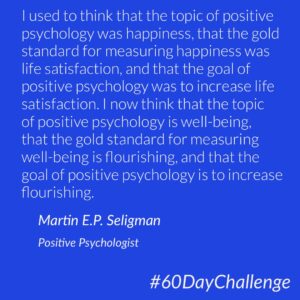 I spent some time over the last few days re-reading the comments/interactions in all of the posts over the past two weeks. (Thank you for engaging in these important conversations! 🙏🏻🙏🏻🙏🏻)
I spent some time over the last few days re-reading the comments/interactions in all of the posts over the past two weeks. (Thank you for engaging in these important conversations! 🙏🏻🙏🏻🙏🏻)
I’m finding a theme of flourishing woven throughout the contributions, directly and indirectly. I’m curious what you think….
We read earlier (post #1) how human-centered learning is framed in KnowledgeWorks’ latest whitepaper: Envisioning Human-Centered Learning Systems. And it seems to resonate with many of you.
“It is a systemic shift that aligns educational structures, policies, practices and learning experiences around the flourishing and well-being of the people involved in education – including students, teachers, administrators, families and community members.” pg. 3
You see, the school-centered model of education has been an approach considering learners as coming to the work of learning with a deficit. Learners lack certain skills and knowledge—as determined by the “system” through age-old structures such as curriculum, policy and generally accepted adult wisdom.
What school-centered models miss (making the work of learning unbalanced) is a curiosity in the assets individual learners bring to the work of learning—experiences, curiosities, gifts, passions and purpose.
Appreciating (and building on) these assets from the outset is the essence of human-centered learning—approaching the work we do, not from a “what is weak/what is wrong?” stance, but from one of “what positive assets already exist that we can build on?’
When educators take a human-centered approach, does that lead to flourishing?
Positive psychologist, Dr. Martin Seligman, is considered to be the “founding father” of flourishing. Through his research on happiness and positive psychology, Seligman has proposed the PERMA model. The five factors of the model contribute to a sense of flourishing.
- Positive emotions – such as joy, gratitude, curiosity, awe and hope
- Engagement – with the world and our work/hobbies
- Relationships – deep and meaningful
- Meaning – comprehension, purpose and mattering
- Accomplishments – achieving our goals through application of strengths and talents
The theory goes that the more we tend to each state of the model, the greater the flourishing.
Flourishing. Admittedly, this is new learning for me (or at least a new way of framing the challenge), but it would appear to resonate with a vision for learner-centered and human-centered environments. What resonates with you?
—–
❓ Provocations:
Is flourishing the outcome we are working to achieve for everyone in the system? Or is flourishing something else? Approaching this inquiry from an asset model: As educators–teachers and leaders–how do our actions lead to the development of the five factors in the PERMA model, thus flourishing? How does the idea of flourishing intersect with our domains of interest here: learning, leadership, longview and longevity/vitality?
💎 Resource:
🧠 Mindset:
Flourishing; asset model
💡 Area:
Leadership and learning
📣 Drop your thoughts in the comments, or in the Facebook group, and feel free to share resources. 🔥🔥🔥
- A silver lining - January 22, 2022
- Is our use of tech working against us? 🤔 - September 8, 2021
- What’s NOT going to change in the next 10 years? 🤔 - September 7, 2021